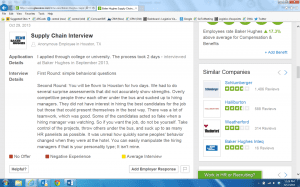You’ve been offered an interview for a supply chain position, and you need to prepare for it. What next?
Research the Company – Before you ever go on an interview, you must first research the company and be fully prepared to answer the questions “What do you know about our company?” or “Why do you want to work here?” If these questions are not asked, a candidate will almost always be asked if they have any questions. Genuine questions about how a company competes in their market will be well received.
Go to the company’s website, spend time there. If the company is public, read pertinent sections of the Annual Report, particularly about their strategy and how they go to market, the financials, and their products. You can search the document using terms like “logistics” or “transportation” to find details of their strategy that are related to your job.
Do Google searches using the company’s name and read about their successes and failures over the past few years. Understand who the big players in their industry are, and spend some time reading those companies web sites and Annual Reports.
Understand the Job Requirements – Make sure you really understand the job you are applying for; duties, skills, relevant experience, and other requirements. If you are working with a supply chain recruiter, realize they can be a good resource to clarify responsibilities and provide insights into what the company is looking for.
Research the Interview Process – The Glassdoor website is a good resource. They actually have a part of their site titled Supply Chain Interview Questions. If the company interviewing you is a big company, they is apt to be feedback on that company from candidates that interviewed for jobs there. Good content is often provided surrounding the length of the interview, the interview process, the types of questions asked, and even specific questions that were asked.
If you’ve been offered an interview from a company not in Glassdoor, the process is tougher. Here your best resource is LinkedIn. Using the advanced find feature of LinkedIn, you put in the following:
Keyword: Supply chain or logistics
Company: The company or division’s name
Once you type in the name, a box will appear that says “Current or Past.” Select “Past” and hit “Search.” A list of ex-employees will appear. Ask to “connect” to employees that have left in the last few years, and then send them an email explaining that you have an interview opportunity with their former employee and ask if they would be willing to talk to you about their experience. To be able to do this efficiently, you will have to pay a fee to LinkedIn, but it is not large and it is a good investment.
Prepare for Behavioral Questions – If GlassDoor and LinkedIn end up being dead ends, then prepare for behavioral questions. Behavioral questions are becoming more common. Behavioral questions are designed to elicit specific and detailed responses about the situations or tasks in which you were involved in previous jobs, the actions you took, and the results. The questions sometimes start with the phrase “Tell me about a time when…” The way to prepare for these questions is to focus on your most relevant accomplishments and achievements that relate to the core competencies they’re seeking for their position. Those competencies are often outlined within the job description. Commit to memory your top 4 or 5 achievement stories and be prepared to adopt those stories to the behavioral question.
Sell your Work Ethic – 3PLs are some of the biggest hirers in the supply chain arena. Most work their employees hard. Unless it is an analyst position, requiring IT or business intelligence capabilities, then you need to realize this won’t be a 40 hour a week job and may not even be a 60 hour a week job. Not surprisingly, 3PLs often have high turnover in their management ranks. Hitting this head on can be effective, “I understand this is not a 9 to 5 job and that a lot of your hires can’t take the pace. If this means greater opportunities to learn and grow, then great! I’m all for it.” Of course, if you are a believer in life work balance, then you should not be interviewing with this company.
Practice Interviewing – Most colleges have Career Centers that will run mock interviews for students. Share what you have learned about the company and interview process with the staffer and then do a mock interview. If you are not a college grad, try and do the same thing with a family member or acquaintance that has had a successful business career.
Good Luck!


















Leave a Reply